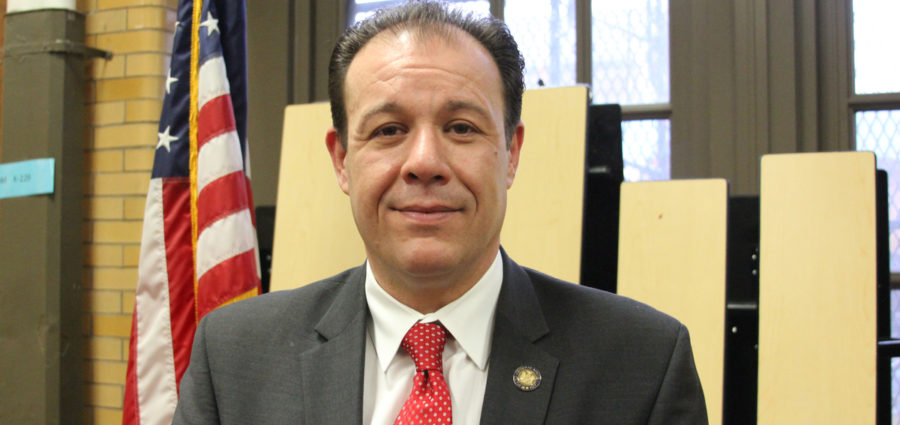City Council candidates typically promote themselves by knocking on doors, speaking at candidate forums, and sending campaign mail — repeatedly — to the addresses of people they think will definitely vote. What they cannot ever afford to do is run a television commercial in a market as prohibitively expensive as New York City.
Mark Gjonaj is not your typical candidate.
In a 30-second spot airing across the Bronx, where Gjonaj is hoping to win a City Council seat next week, two of the borough’s most powerful pols, State Senator Jeff Klein and Bronx Borough President Ruben Diaz Jr., tout his bona fides. “Mark Gjonaj is the wakeup call we need down at City Hall,” Klein says. “We need to pick up garbage, clean graffiti, and maintain our quality of life.”
By any measure of endorsements and money, Gjonaj — pronounced joh-nai — is the front-runner. As a sitting state assemblymember looking to make the jump to the City Council, where the pay is higher and the commutes are shorter, he has racked up the support of major labor unions, the Bronx Democratic Party, and the numerous elected officials who follow in the wake of such endorsements.
What he has also done is to far out-fundraise and outspend his closest competition, dropping more than double the cash of any other active City Council candidate. Gjonaj has spent $716,469 so far to get himself elected, more than anyone outside of Mayor Bill de Blasio. Had he participated in the public matching funds system like most candidates, his spending would have been capped at $182,000. (He has raised $745,303.)
“We have so many needs out there,” Gjonaj tells the Voice over a cup of coffee in a Pelham Parkway diner. “In a perfect world, if all was moving fine and everyone’s needs were met, the campaign finance system would probably be the best way to do it, but we’re not the perfect world. There’s a lot of pain and hurt out there and it’s hard for me to justify telling anyone that they don’t have a program or their needs can’t be met — and we’re using taxpayer dollars to address elections.”
What Gjonaj has not been able to buy is the support of the district’s term-limited city councilmember, Jimmy Vacca, who has represented the neighborhoods of Pelham Parkway, Morris Park, Throggs Neck, City Island, and several others for 12 years. Vacca, a popular former district manager of the local community board, is strongly backing Marjorie Velazquez, an accountant and Democratic district leader.
Velazquez, who notes she would be one of the few Latinas in the council, has emerged as a favorite of city progressives: In addition to the Working Families Party, outgoing Council Speaker Melissa Mark-Viverito is supporting her candidacy. A third prominent candidate, John Doyle, is a former aide to Klein and a civic leader on City Island. (Two other Democrats are running but have raised and spent little.)
“If you feel the need to spend so much money and you’re the incumbent, then there’s something wrong,” says Velazquez. “You’re not that popular. You ultimately cannot buy our votes.”
Gjonaj was first elected in 2012, unseating an incumbent, and became the state’s first Albanian-American legislator, something he is immensely proud of. A prominent real estate broker who is among the wealthiest lawmakers in the state, Gjonaj says he’s running for the open council seat because he wants to make more change on the city level.
“Everyone knew Gjonaj had an eye for city government mainly because he pretty much felt like he was a little more tied to neighborhood issues than state issues,” says David Cruz, editor-in-chief of the Bronx-based Norwood News, which has closely covered Gjonaj’s career.
As a candidate, Gjonaj has proposed allowing public housing residents to withhold rent if repairs are not made in a timely fashion. (There are two vote-rich public housing developments in the district.) He is suing the city for allegedly situating too many homeless shelters in the Bronx, a move backed by elected officials who believe the area is overburdened relative to other boroughs. His record of legislative accomplishments is thin, but he is known in his assembly district for hosting a variety of popular festivals as well as Bronx Day in Albany, where borough businesses showcase their products and services in the state capitol.
The northeast Bronx district retains its suburban flavor — home-owners abound, civic associations thrive, and neighborhoods are without subway access — but, like much of the city, it is undergoing demographic shifts. Forty-two percent of Democrats in the district are Hispanic, according to an estimate from Jerry Skurnik of Prime New York, and 21 percent are white. Another 13 percent are African-American, says Skurnik.
One of the major issues facing the district is overdevelopment, says Vacca, who is wary of “out of context” residential and commercial buildings straining infrastructure and taking up parking spaces. Another is transit: All the candidates want to see de Blasio’s ferry network extended to the district, and support a congestion pricing plan, known as Move NY, that would toll the East River bridges but lower tolls on the Bronx-Whitestone Bridge, which connects east Bronx to Queens.
Doyle, who worked as Klein’s community affairs director and is now a public affairs director at Jacobi Medical Center, has been a persistent critic of Gjonaj and even of his old boss’s creation of the Independent Democratic Conference, a group of eight breakaway Democrats who have helped keep Republicans in the state senate majority. Doyle and Velazquez see Gjonaj as someone in the mold of Klein: deceptively conservative and too beholden to an anti-tenant real estate lobby.
“All the bad developers are giving to one candidate,” Doyle says. “He’s another cog in the county machine.”
Gjonaj has taken about $100,000 from real estate developers, several with development interests in the Bronx. He has drawn the fire of his rivals and tenant groups for voting no on a recent bill that would have repealed the 1997 vacancy decontrol law, which allowed many thousands of apartments to leave the rent-regulation program. (Most Assembly Democrats voted yes.)
Gjonaj did, however, join colleagues in supporting two pro-tenant bills: one to eliminate the vacancy bonus landlords charge when residents move out of rent-regulated apartments, and another to restrict the ability of landlords to hit rent-stabilized tenants paying preferential rent with sudden exorbitant rent increases when they renew their leases.
Controversy dogs Gjonaj elsewhere. He has funneled more than $72,000 in campaign cash to his brother’s restaurant. A nonprofit he founded has raised questions for not being registered with the New York State Charities Bureau. And he claimed in a mailer to have supported the Women’s Equality Act — a ten-point women’s rights bill — while actually voting against it. (Gjonaj called the bill language “vague.”)
What is clear, however, is that Gjonaj remains a front-runner, and could very well enter a council that will be tougher and more belligerent than Mayor de Blasio is used to. At a public forum in July, Gjonaj attacked de Blasio for not successfully lowering water rates, telling a City Island crowd “when I get to City Hall I promise you, as [de Blasio] does when he sees me, the vein on his neck pops out when I bring it to his attention. He lied, he misled us.”
Gjonaj, though, did endorse de Blasio for re-election. “Eight and a half million people, not easy to represent,” he says now, putting it more diplomatically. “I know his heart’s in the right place. I know he’s serving New York City well.”
For close watchers of the New York political scene, there is the question of how much of a precedent Gjonaj will set by spending so much cash on a local race. Will more candidates decide to do the same?
Vacca, a supporter of publically funded elections, hopes not.
“I do know this could be the first million-dollar council race in the city’s history,” the outgoing councilmember says. “It concerns me because I believe in the campaign finance board system. I’ve gone out of my way to show that.”








